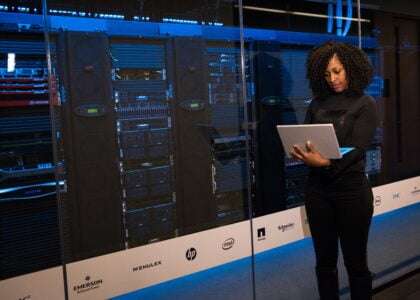Protect Your Website with Robust Network Security by Allsorts Hosting
Discover the importance of network security for your website and how Allsorts Hosting ensures a secure online environment. Safeguard your data and protect against cyber threats with our advanced network security measures.
Introduction:
In today’s digital landscape, ensuring the security of your online presence is of utmost importance. Cyber threats and attacks pose a significant risk to websites, their data, and their visitors. Allsorts Hosting understands the criticality of network security and provides robust measures to protect your website. In this article, we will explore the concept of network security, its importance, and how Allsorts Hosting implements advanced security measures to safeguard your website and sensitive information.
Table of Contents:
| Sr# | Headings |
|---|---|
| 1. | Understanding Network Security |
| 2. | Importance of Network Security |
| 3. | Protecting Against Cyber Threats |
| 4. | Allsorts Hosting’s Network Security Measures |
| 5. | Firewalls and Intrusion Detection Systems |
| 6. | Secure Data Encryption |
| 7. | Regular Security Updates and Patches |
| 8. | Proactive Monitoring and Threat Detection |
| 9. | User Access Controls and Authentication |
| 10. | Backup and Disaster Recovery |
| 11. | Allsorts Hosting: Your Secure Network Partner |
| 12. | Frequently Asked Questions (FAQs) |
1. Understanding Network Security
Network security refers to the measures and protocols in place to protect computer networks and their connected devices from unauthorized access, data breaches, and cyberattacks. It involves the implementation of various security technologies, policies, and practices to ensure the confidentiality, integrity, and availability of network resources.
Network security encompasses both hardware and software components, including firewalls, antivirus software, intrusion detection systems, encryption mechanisms, user access controls, and more. By implementing robust network security measures, organizations can safeguard their networks, data, and systems from potential threats.
In today’s interconnected world, where businesses and individuals rely heavily on the internet for communication, transactions, and data storage, network security plays a crucial role in maintaining a safe and trustworthy online environment.
2. Importance of Network Security
Network security is of paramount importance for several reasons:
Protection of Sensitive Data
Websites often handle sensitive data, including customer information, financial transactions, and confidential business data. Network security measures ensure that this sensitive data remains protected and inaccessible to unauthorized individuals or malicious actors. By implementing strong security protocols, organizations can mitigate the risk of data breaches and unauthorized access.
Data breaches can have severe consequences, including financial loss, damage to reputation, legal implications, and loss of customer trust. By prioritizing network security, organizations can establish a robust defense against potential data breaches and protect their sensitive information from falling into the wrong hands.
Prevention of Cyber Threats
Cyber threats such as malware, ransomware, phishing attacks, and DDoS (Distributed Denial of Service) attacks are pervasive in the digital landscape. These threats can cause significant damage, disrupt operations, and compromise sensitive data. Robust network security measures act as a preventive shield, identifying and mitigating these threats before they can cause harm.
Malware can infect websites and compromise their functionality, steal sensitive data, or enable unauthorized access. Phishing attacks can trick users into revealing their login credentials or financial information, leading to identity theft or financial loss. DDoS attacks can overwhelm a website’s server, rendering it inaccessible to legitimate users. Network security measures such as firewalls, intrusion detection systems, and malware scanners help detect and block these threats, ensuring the integrity and availability of websites and their data.
Maintaining Business Continuity
A successful cyberattack can have severe consequences for a business, including financial loss, reputational damage, and interruption of services. Network security measures help maintain business continuity by minimizing the impact of cyber incidents and enabling quick recovery. By implementing backup and disaster recovery solutions, organizations can ensure the availability of critical data and systems even in the face of a security breach.
Disruptions to business operations can result in lost revenue, damaged customer relationships, and decreased productivity. Network security measures such as regular backups, redundant systems, and incident response plans help organizations recover quickly from security incidents and minimize the downtime associated with recovering from an attack.
3. Protecting Against Cyber Threats
Cyber threats continue to evolve and become more sophisticated, making it crucial for organizations to implement robust security measures to protect against them. Here are some key practices and technologies for protecting against cyber threats:
a. Firewalls and Intrusion Detection Systems
Firewalls act as a barrier between the internal network and external networks, monitoring incoming and outgoing traffic and enforcing security policies. They examine network packets, filtering out potentially harmful traffic and unauthorized access attempts. Intrusion detection systems (IDS) monitor network activity, looking for patterns that indicate potential attacks or unauthorized behavior.
Firewalls and IDS work together to create a layered defense, blocking malicious traffic, detecting intrusion attempts, and alerting administrators to potential threats. By implementing firewalls and IDS, organizations can significantly enhance their network security posture and protect their resources from unauthorized access and attacks.
b. Secure Data Encryption
Data encryption is a critical component of network security. It involves encoding data in such a way that it can only be accessed or deciphered by authorized individuals who possess the decryption key. Encryption protects data both during transmission and storage, ensuring its confidentiality and integrity.
Secure data encryption is especially crucial when transmitting sensitive information over the internet, such as passwords, financial details, and personal data. By encrypting data, organizations can prevent unauthorized interception and access, even if the data is intercepted during transmission or compromised due to a security breach.
c. Regular Security Updates and Patches
Regularly updating software and applying security patches is essential for maintaining network security. Software vendors frequently release updates to address known vulnerabilities and strengthen security. Failing to install these updates promptly can leave systems susceptible to exploitation.
Organizations should establish a patch management process to regularly assess, test, and apply security updates across their network infrastructure, including servers, operating systems, applications, and network devices. This proactive approach helps close security gaps and reduces the risk of exploitation by cybercriminals.
d. Proactive Monitoring and Threat Detection
Proactive monitoring and threat detection allow organizations to identify and respond to potential security incidents promptly. Monitoring network traffic, system logs, and security events can help detect indicators of compromise and abnormal behavior. By implementing advanced security information and event management (SIEM) systems, organizations can aggregate and analyze security logs from various sources, enabling faster detection and response to security incidents.
Additionally, organizations can employ intrusion prevention systems (IPS) that actively monitor and respond to potential threats in real-time. IPS combines network traffic analysis, anomaly detection, and behavioral analysis to detect and block suspicious activities and known attack patterns.
e. User Access Controls and Authentication
User access controls and authentication mechanisms play a crucial role in network security. Strong password policies, multi-factor authentication (MFA), and user role-based access control (RBAC) ensure that only authorized individuals can access sensitive resources.
Enforcing strong password policies, such as using complex passwords, enforcing password rotation, and implementing account lockout policies, helps prevent unauthorized access through password guessing or brute-force attacks. Multi-factor authentication adds an extra layer of security by requiring users to provide additional verification factors, such as a unique code sent to their mobile device, in addition to their password.
User role-based access control allows organizations to grant different levels of access based on user roles and responsibilities. This ensures that individuals have access only to the resources necessary for their job function, reducing the risk of unauthorized access and potential damage caused by compromised accounts.
f. Backup and Disaster Recovery
Backup and disaster recovery processes are crucial for maintaining business continuity and mitigating the impact of security incidents. Regular backups ensure that critical data and system configurations are preserved and can be restored in the event of a security breach or data loss.
Organizations should establish robust backup strategies, including offsite backups, incremental backups, and periodic testing of the restore process. This ensures that in the event of a security incident, data can be quickly restored, minimizing the impact on business operations and customer trust.
4. Allsorts Hosting’s Network Security Measures
Allsorts Hosting understands the critical role of network security in maintaining a secure online environment for your website and data. They employ advanced security measures to protect against potential threats. Here are some of the key network security measures implemented by Allsorts Hosting:
a. Firewalls and Intrusion Detection Systems
Allsorts Hosting utilizes state-of-the-art firewalls and intrusion detection systems to monitor network traffic and identify potential threats. Firewalls act as a barrier between your website and unauthorized access attempts, filtering out malicious traffic and protecting against intrusion. Intrusion detection systems analyze network activity in real-time, alerting administrators to any suspicious behavior and potential security breaches.
By implementing firewalls and intrusion detection systems, Allsorts Hosting ensures that your website and data are protected against unauthorized access and potential threats.
b. Secure Data Encryption
To ensure the confidentiality of your data, Allsorts Hosting implements secure data encryption protocols. Encryption converts sensitive information into an unreadable format, making it difficult for unauthorized individuals to access or decipher. This helps protect data transmitted between your website and visitors, as well as data stored on servers.
By encrypting data, Allsorts Hosting provides an additional layer of security, safeguarding your sensitive information from unauthorized access or interception.
c. Regular Security Updates and Patches
Allsorts Hosting keeps their network infrastructure up to date with the latest security updates and patches. This ensures that any vulnerabilities or weaknesses in the system are promptly addressed and mitigated. By regularly applying security updates, Allsorts Hosting strengthens the overall security posture of their network and protects against known vulnerabilities.
d. Proactive Monitoring and Threat Detection
Allsorts Hosting employs proactive monitoring and threat detection mechanisms to identify and respond to potential security threats. Their security teams continuously monitor network activity, analyze logs, and employ advanced threat detection tools to identify and mitigate any suspicious activity or potential breaches. This proactive approach helps prevent security incidents and ensures a secure online environment for your website.
e. User Access Controls and Authentication
Allsorts Hosting implements robust user access controls and authentication mechanisms to ensure that only authorized individuals can access sensitive resources. Multi-factor authentication, strong password policies, and role-based access controls are implemented to prevent unauthorized access to your website’s backend and administrative areas. These measures minimize the risk of unauthorized access and protect against credential-based attacks.
f. Backup and Disaster Recovery
Allsorts Hosting understands the importance of data backup and disaster recovery. They implement regular backup processes to ensure the availability of your website’s data in the event of a security incident or data loss. Backup copies are stored securely in offsite locations to provide redundancy and facilitate quick recovery in case of a disaster.
By implementing robust backup and disaster recovery strategies, Allsorts Hosting ensures the availability and integrity of your website’s data, even in challenging circumstances.
11. Allsorts Hosting: Your Secure Network Partner
When it comes to network security, Allsorts Hosting is your trusted partner. With their commitment to robust security measures, you can have peace of mind knowing that your website and data are protected against potential threats. Allsorts Hosting’s expertise in network security, combined with their reliable hosting infrastructure, ensures a secure online environment for your online presence.
Their dedicated security teams work diligently to monitor and mitigate potential risks, keeping your website safe from cyber threats. With 24/7 customer support, you can rely on Allsorts Hosting to address any security concerns or provide assistance in implementing additional security measures.
Frequently Asked Questions (FAQs)
1. What should I do to enhance the security of my website?
In addition to hosting with a secure provider like Allsorts Hosting, there are several steps you can take to enhance the security of your website. These include using strong passwords, keeping your website’s software and plugins up to date, regularly backing up your data, implementing SSL encryption, and educating yourself and your team about cybersecurity best practices.
2. Does Allsorts Hosting offer SSL certificates for secure communication?
Yes, Allsorts Hosting provides SSL certificates to enable secure communication between your website and its visitors. SSL certificates encrypt the data transmitted between the browser and the server, ensuring the confidentiality and integrity of sensitive information.
3. Can Allsorts Hosting help in case of a security incident?
Absolutely! Allsorts Hosting has dedicated security teams that are experienced in handling security incidents. They can assist you in identifying and mitigating security breaches, restoring services, and implementing additional security measures to prevent future incidents.
4. How often does Allsorts Hosting perform backups?
Allsorts Hosting performs regular backups of your website’s data to ensure its availability in case of a security incident or data loss. The frequency of backups depends on the hosting plan you choose. It is recommended to inquire about the backup frequency and retention policies when selecting your hosting plan.
5. Can I implement additional security measures for my website?
Yes, you can implement additional security measures for your website, such as web application firewalls, security plugins, and content delivery network (CDN) services. Allsorts Hosting can provide guidance and support in implementing these measures to enhance the security of your website.
Conclusion:
Network security is vital for safeguarding your online presence against cyber threats and ensuring the protection of your website and sensitive data. Allsorts Hosting prioritizes network security and implements advanced measures to create a secure online environment for your website. By partnering with Allsorts Hosting, you can have confidence in the security of your online presence and focus on your core business activities.




